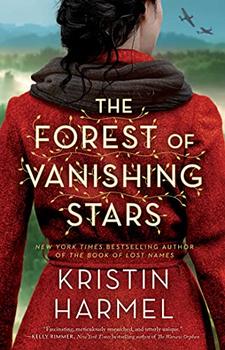Summary | Excerpt | Reading Guide | Reviews | Beyond the Book | Readalikes | Genres & Themes | Author Bio

A Novel
by Kristin HarmelCHAPTER ONE
1922
The old woman watched from the shadows outside Behaimstrasse 72, waiting for the lights inside to blink out. The apartment's balcony dripped with crimson roses, and ivy climbed the iron rails, but the young couple who lived there—the power-hungry Siegfried Jüttner and his aloof wife, Alwine—weren't the ones who tended the plants. That was left to their maid, for the nurturing of life was something only those with some goodness could do.
The old woman had been watching the Jüttners for nearly two years now, and she knew things about them, things that were important to the task she was about to undertake.
She knew, for example, that Herr Jüttner had been one of the first men in Berlin to join the National Socialist German Workers' Party, a new political movement that was slowly gaining a foothold in the war-shattered country. She knew he'd been inspired to do so while on holiday in Munich nearly three years earlier, after seeing an angry young man named Adolf Hitler give a rousing speech in the Hofbräukeller. She knew that after hearing that speech, Herr Jüttner had walked twenty minutes back to the elegant Hotel Vier Jahreszeiten, had awoken his sleeping young wife, and had lain with her, though at first she had objected, for she had been dreaming of a young man she had once loved, a man who had died in the Great War.
The old woman knew, too, that the baby conceived on that autumn-scented Bavarian night, a girl the Jüttners had named Inge, had a birthmark in the shape of a dove on the inside of her left wrist.
She also knew that the girl's second birthday was the following day, the sixth of July, 1922. And she knew, as surely as she knew that the bell-shaped buds of lily of the valley and the twilight petals of aconite could kill a man, that the girl must not be allowed to remain with the Jüttners.
That was why she had come.
The old woman, who was called Jerusza, had always known things other people didn't. For example, she had known it the moment Frédéric Chopin had died in 1849, for she had awoken from a deep slumber, the notes of his "Revolutionary Étude" marching through her head in an aggrieved parade. She had felt the earth tremble upon the births of Marie Curie in 1867 and Albert Einstein in 1879. And on a sweltering late June day in 1914, two months after she had turned seventy-four, she had felt it deep in her jugular vein, weeks before the news reached her, that the heir to the Austro-Hungarian throne had been felled by an assassin's bullet, cracking the fragile balance of the world. She had known then that war was brewing, just as she knew it now. She could see it in the dark clouds that hulked on the horizon.
Jerusza's mother, who had killed herself with a brew of poisons in 1860, used to tell her that the knowing of impossible things was a gift from God, passed down through maternal blood of only the most fortunate Jewish women. Jerusza, the last of a bloodline that had stretched for centuries, was certain at times that it was a curse instead, but whatever it was, it had been her burden all her life to follow the voices that echoed through the forests. The leaves whispered in the trees; the f lowers told tales as old as time; the rivers rushed with news of places far away. If one listened closely enough, nature always spilled her secrets, which were, of course, the secrets of God. And now, it was God who had brought Jerusza here, to a fog-cloaked Berlin street corner, where she would be responsible for changing the fate of a child, and perhaps a piece of the world, too.
Jerusza had been alive for eighty-two years, nearly twice as long as the typical German lived. When people looked at her—if they bothered to look at all—they were visibly startled by her wizened features, her hands gnarled by decades of hard living. Most of the time, though, strangers simply ignored her, just as Siegfried and Alwine Jüttner had done each of the hundreds of times they had passed her on the street. Her age made her particularly invisible to those who cared most about appearance and power; they assumed she was useless to them, a waste of time, a waste of space. After all, surely a woman as old as she would be dead soon. But Jerusza, who had spent her whole life sustained by the plants and herbs in the darkest spots of the deepest forests, knew that she would live nearly twenty years more, to the age of 102, and that she would die on a spring Tuesday just after the last thaw of 1942.
Excerpted from The Forest of Vanishing Stars by Kristin Harmel. Copyright © 2021 by Kristin Harmel. Excerpted by permission of Gallery Books. All rights reserved. No part of this excerpt may be reproduced or reprinted without permission in writing from the publisher.
Your guide toexceptional books
BookBrowse seeks out and recommends the best in contemporary fiction and nonfiction—books that not only engage and entertain but also deepen our understanding of ourselves and the world around us.